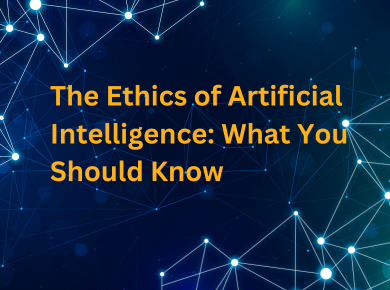Artificial Intelligence (AI) is no longer a distant concept confined to the realms of science fiction. From virtual assistants and facial recognition systems to autonomous vehicles, AI is shaping the way we live and work. However, alongside its transformative potential comes a myriad of ethical concerns that demand our attention. Here’s what you need to know about the ethics of AI and its implications for society.
1. Bias and Fairness
AI systems learn from data, and if the training data contains biases, the AI will likely perpetuate or even amplify them. For example, biased hiring algorithms have been shown to discriminate against women or minority groups. Ensuring fairness in AI requires rigorous scrutiny of datasets and transparent methodologies for training algorithms.
What can be done?
- Diverse and inclusive datasets.
- Regular audits to identify and mitigate biases.
- Establishing ethical guidelines for AI development and deployment.
2. Privacy Concerns
AI-powered technologies often rely on massive amounts of personal data. While this data enables functionality like personalized recommendations or fraud detection, it also raises significant privacy concerns. Unauthorized data usage or breaches can have serious consequences for individuals and organizations alike.
What can be done?
- Strong data protection policies.
- Adoption of privacy-preserving techniques such as differential privacy.
- Transparent data usage policies that inform users.
3. Accountability and Transparency
Who is responsible when an AI system makes a mistake? Accountability becomes murky when decisions are made by autonomous systems. Moreover, the “black box” nature of many AI algorithms makes it difficult to understand how decisions are reached.
What can be done?
- Development of explainable AI (XAI) to make decision-making processes more transparent.
- Clear accountability frameworks assigning responsibility to developers, organizations, and regulators.
- Regular reporting on AI performance and ethical compliance.
4. Job Displacement and Economic Impact
Automation driven by AI has the potential to displace millions of jobs across industries. While it may create new roles, there’s a pressing need to address the economic and social implications for those affected by job loss.
What can be done?
- Reskilling and upskilling programs to prepare workers for AI-era jobs.
- Government policies to support affected workers.
- Encouraging human-AI collaboration rather than full automation.
5. AI and Human Rights
AI applications such as facial recognition and predictive policing have raised concerns about surveillance, discrimination, and the erosion of human rights. Without proper regulation, such technologies can be misused, leading to societal harm.
What can be done?
- Strong regulatory frameworks to govern the use of AI in sensitive areas.
- Promoting AI systems that align with human rights principles.
- Public discourse and advocacy to raise awareness of these issues.
6. Autonomy and Control
As AI systems become more advanced, questions arise about maintaining human control over critical systems. From autonomous weapons to decision-making in healthcare, there’s a fine line between beneficial autonomy and loss of human oversight.
What can be done?
- Clear boundaries on where and how AI can operate autonomously.
- Development of fail-safe mechanisms to ensure human intervention when needed.
- Ethical research prioritizing human-centered AI.
Final Thoughts
The ethics of AI is not just a technical issue; it’s a societal one that requires input from technologists, policymakers, ethicists, and the public. By addressing these challenges proactively, we can harness AI’s potential while safeguarding fundamental values like fairness, privacy, and human rights. Staying informed and engaged in this dialogue is essential as AI continues to evolve and shape our world.
What are your thoughts on the ethical challenges of AI? Join the conversation and help shape a future where technology serves humanity responsibly.




